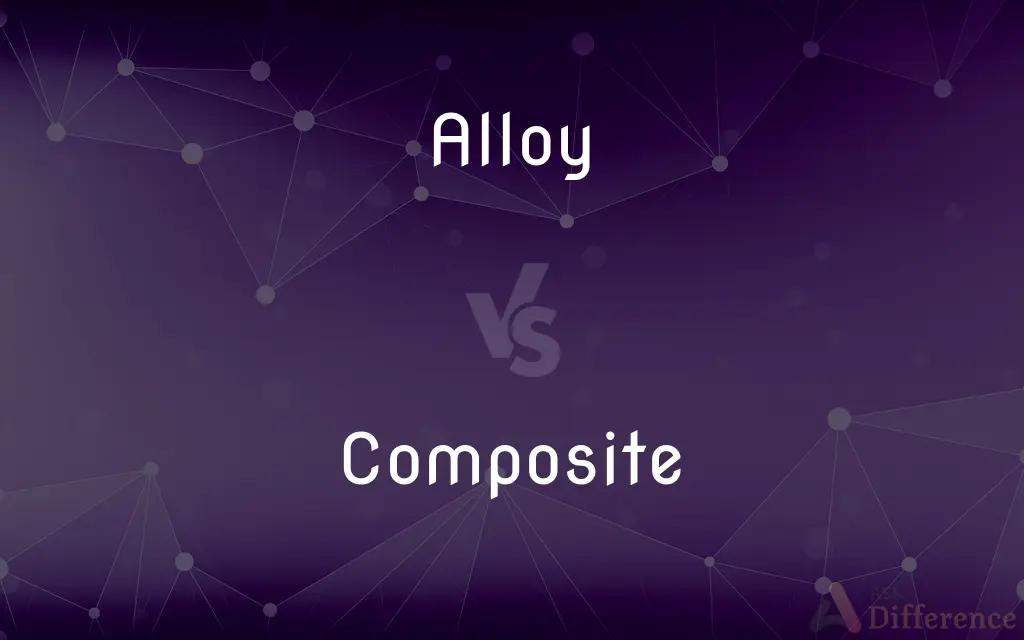Alloy vs. Composite — What's the Difference?
By Tayyaba Rehman — Updated on October 13, 2023
Alloy is a mixture of two or more metals, while Composite is a material made by combining two or more different materials to enhance properties.

Difference Between Alloy and Composite
Table of Contents
ADVERTISEMENT
Key Differences
Alloy and Composite materialize as differing concepts in materials science, with the former being a mixture of metals and possibly non-metals, while the latter encompasses materials combined to create enhanced properties. Alloy involves the fusion of metallic elements to leverage advantageous properties, while Composite aims to amalgamate materials to produce a product with superior attributes. An Alloy typically maintains a singular, uniform matter phase despite its mixed composition, while a Composite usually presents visibly distinct phases or layers. Alloy, by uniting metals, often seeks to enhance durability, corrosion resistance, or tensile strength, while Composite combines materials to derive benefits like lightweightness, strength, or resistance to wear. Noteworthy is the presence of diverse materials in a Composite, while an Alloy primarily involves metals, elucidating vital differentiation in their respective compositions and applications.
Comparison Chart
Basic Definition
Mixture of two or more metals
Material made by combining different materials
Homogeneity
Generally homogeneous
Heterogeneous and often visibly layered
Material Types
Predominantly metallic
Can be made of metal, plastic, wood, etc.
Mechanical Properties
Aims to enhance certain metal properties
Aims to combine best properties of all components
ADVERTISEMENT
Typical Uses
Used in making coins, jewelry, etc.
Used in aerospace, automotive structures, etc.
Compare with Definitions
Alloy
Alloy is a metal made by combining two or more metallic elements.
Brass is an alloy of copper and zinc.
Composite
Composites are engineered to create enhanced material properties.
The composite material was both light and strong.
Alloy
Alloys are created to enhance specific properties of metals.
The alloy was designed to resist corrosion.
Composite
Composite materials maintain visible distinctions between combined materials.
The composite displayed both metal and plastic layers.
Alloy
Alloy can contain non-metal elements to improve qualities.
Carbon is often added to iron to create a stronger alloy.
Composite
Composites are utilized for their versatile material characteristics.
The composite was chosen for its excellent heat resistance.
Alloy
Alloys typically present a homogeneous composition.
The alloy displayed uniform properties throughout.
Composite
Made up of several parts or elements
This soup is one of those composite dishes which you gradually build up
Alloy
An alloy is an admixture of metals, or a metal combined with one or more other elements. For example, combining the metallic elements gold and copper produces red gold, gold and silver becomes white gold, and silver combined with copper produces sterling silver.
Composite
Relating to or denoting a classical order of architecture consisting of elements of the Ionic and Corinthian orders.
Alloy
A metallic solid or liquid that is composed of a homogeneous mixture of two or more metals or of metals and nonmetal or metalloid elements, usually for the purpose of imparting or increasing specific characteristics or properties
Brass is an alloy of zinc and copper.
Composite
Relating to or denoting plants of the daisy family (Compositae ).
Alloy
A mixture; an amalgam
"Television news has ... always been an alloy of journalism and show business" (Bill Moyers).
Composite
A thing made up of several parts or elements
The English legal system is a composite of legislation and judicial precedent
Alloy
The relative degree of mixture with a base metal; fineness.
Composite
A plant of the daisy family (Compositae ).
Alloy
Something added that lowers value or purity.
Composite
The Composite order of architecture.
Alloy
To combine (metals) to form an alloy.
Composite
Combine (two or more images) to make a single picture
Photographic compositing by computer
Alloy
To combine; mix
Idealism that was alloyed with political skill.
Composite
Made up of distinct components; compound.
Alloy
To debase by the addition of an inferior element.
Composite
Made by combining two or more existing things, such as photographs.
Alloy
A metal that is a combination of two or more elements, at least one of which is a metal.
Composite
(Mathematics) Having factors; factorable.
Alloy
(archaic) A metal of lesser value, mixed with a metal of greater value.
Gold without alloy
Composite
(Botany) Of, belonging to, or characteristic of the composite family.
Alloy
An admixture; something added which stains, taints etc.
Composite
Composite(Architecture) Of, relating to, or being in the Composite order.
Alloy
(figurative) Fusion, marriage, combination.
Composite
A structure or entity made up of distinct components
A musical suite that is a composite of operatic themes.
Alloy
To mix or combine; often used of metals.
Composite
A material in which two or more distinct, structurally complementary materials, usually a matrix material and a reinforcing material, are combined to produce structural or functional properties not present in any individual component. Wood, bone, concrete, plastic reinforced by glass fibers, and graphite reinforced with carbon fibers are all composite materials.
Alloy
To reduce the purity of by mixing with a less valuable substance.
To alloy gold with silver or copper, or silver with copper
Composite
(Botany) A plant in the composite family.
Alloy
(figurative) To impair or debase by mixture.
To alloy pleasure with misfortunes
Composite
(Mathematics) The application of one function to another. For example, if (x) = x2 and g(x) = x + 1, then the composite (g(x)) = (x + 1)2 and the composite g((x)) = x2 + 1.
Alloy
Any combination or compound of metals fused together; a mixture of metals; for example, brass, which is an alloy of copper and zinc. But when mercury is one of the metals, the compound is called an amalgam.
Composite
To make using distinct components.
Alloy
The quality, or comparative purity, of gold or silver; fineness.
Composite
To make by combining two or more photographs or images.
Alloy
A baser metal mixed with a finer.
Fine silver is silver without the mixture of any baser metal. Alloy is baser metal mixed with it.
Composite
Made up of multiple components; compound or complex.
Alloy
Admixture of anything which lessens the value or detracts from; as, no happiness is without alloy.
Composite
(architecture) Being a mixture of Ionic and Corinthian styles.
Alloy
To reduce the purity of by mixing with a less valuable substance; as, to alloy gold with silver or copper, or silver with copper.
Composite
(mathematics) Having factors other than itself and one; not prime and not one.
Alloy
To mix, as metals, so as to form a compound.
Composite
(botany) Belonging to the Asteraceae family (formerly known as Compositae), bearing involucrate heads of many small florets.
Alloy
To abate, impair, or debase by mixture; to allay; as, to alloy pleasure with misfortunes.
Composite
Employing multiple exposures on a single plate, so as to create an average view of something, such as faces in physiognomy.
Composite portraiture; a composite photograph
Alloy
To form a metallic compound.
Gold and iron alloy with ease.
Composite
A mixture of different components.
Alloy
A mixture containing two or more metallic elements or metallic and nonmetallic elements usually fused together or dissolving into each other when molten;
Brass is an alloy of zinc and copper
Composite
A structural material that gains its strength from a combination of complementary materials.
Alloy
The state of impairing the quality or reducing the value of something
Composite
(botany) A plant belonging to the family Asteraceae, syn. Compositae.
Alloy
Lower in value by increasing the base-metal content
Composite
(mathematics) A function of a function.
Alloy
Make an alloy of
Composite
(mathematics) composite number
Alloy
Alloy is often utilized to create durable structures.
The bridge was built using a strong steel alloy.
Composite
A drawing, photograph, etc. that combines several separate pictures or images.
Composite
A railway carriage with compartments for two different classes of travel; see Composite Corridor.
Composite
To make a composite.
I composited an image using computer software.
Composite
Made up of distinct parts or elements; compounded; as, a composite language.
Happiness, like air and water . . . is composite.
Composite
Belonging to a certain order which is composed of the Ionic order grafted upon the Corinthian. It is called also the Roman or the Italic order, and is one of the five orders recognized by the Italian writers of the sixteenth century. See Capital.
Composite
Belonging to the order Compositæ; bearing involucrate heads of many small florets, as the daisy, thistle, and dandelion.
Composite
That which is made up of parts or compounded of several elements; composition; combination; compound.
Composite
A conceptual whole made up of complicated and related parts;
The complex of shopping malls, houses, and roads created a new town
Composite
Considered the most highly evolved dicotyledonous plants, characterized by florets arranged in dense heads that resemble single flowers
Composite
Consisting of separate interconnected parts
Composite
Of or relating to or belonging to the plant family Compositae
Composite
Used of color
Composite
A modified Corinthian style of architecture (a combination of Corinthian and Ionic)
Composite
A Composite is made by combining two or more distinct materials.
Fiberglass is a composite of glass fibers and resin.
Composite
Composite materials find prevalent use in various industries.
The aerospace industry frequently utilizes composite materials.
Common Curiosities
Can Alloy contain non-metal elements?
Yes, alloys can contain non-metal elements to improve certain properties.
What defines a Composite?
A composite is made by combining two or more different materials to enhance properties.
Are Composites homogeneous?
No, composites are usually heterogeneous and can show visible differences between combined materials.
What industries use Composite materials?
Composites are widely used in aerospace, automotive, and construction industries.
Do Composites typically offer versatile applications?
Yes, composites provide versatile applications due to their varied property enhancements.
What is a common use of Alloy?
Alloys are commonly used in jewelry, coins, and various industrial applications.
How does an Alloy enhance material properties?
Alloys enhance properties like strength, durability, and corrosion resistance of metals.
Can Composites combine metal and plastic?
Yes, composites can combine various materials, including metal and plastic.
What is an Alloy?
An alloy is a metal made by combining two or more metallic elements.
Is Alloy typically a solid solution?
Yes, alloys usually form solid solutions, presenting uniform properties.
What are Composites often utilized for?
Composites are often utilized for their enhanced strength-to-weight ratio.
Can Alloys resist corrosion?
Yes, some alloys are designed specifically to resist corrosion.
Can Alloy be used in structural applications?
Yes, alloys are widely used in structural applications due to their enhanced properties.
Is Alloy a homogenous material?
Typically yes, alloys tend to display homogenous characteristics.
What is an example of a Composite?
An example of a composite is fiberglass, combining glass fibers and resin.
Share Your Discovery

Previous Comparison
Folklore vs. Folktale
Next Comparison
Transom vs. MullionAuthor Spotlight
Written by
Tayyaba RehmanTayyaba Rehman is a distinguished writer, currently serving as a primary contributor to askdifference.com. As a researcher in semantics and etymology, Tayyaba's passion for the complexity of languages and their distinctions has found a perfect home on the platform. Tayyaba delves into the intricacies of language, distinguishing between commonly confused words and phrases, thereby providing clarity for readers worldwide.














































